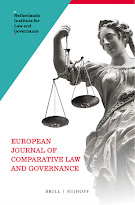Roda Mushkat
European Journal of Comparative Law and Governance
Published online on 26 May 2021
Abstract: Students of comparative constitutional design grapple with myriad complex normative and empirical issues. Prominent among them is the relative effectiveness of different governance regimes. Concerns stemming from the perceived malfunctioning of modern democracies have intensified efforts to diagnose and rectify the supposedly proliferating ills. The seemingly solid post-1978 Chinese record of steadily managing intricate societal challenges has highlighted the possible advantages of the country’s tightly controlled top-down institutional apparatus and its potential value as a model worth broadly exploring and even embracing on a meaningful scale. This view, authoritatively and vigorously articulated by an influential and prolific political philosopher and his academic associates, has evolved to a point whereby the Chinese constitutional order and contemporary experience are portrayed as being capable of fruitfully supplanting democratic structures or, alternatively, productively revitalising them. Yet, on the whole, this remains a controversial politico-legal proposition, conceptually problematic and lacking sufficient factual support.

No comments:
Post a Comment